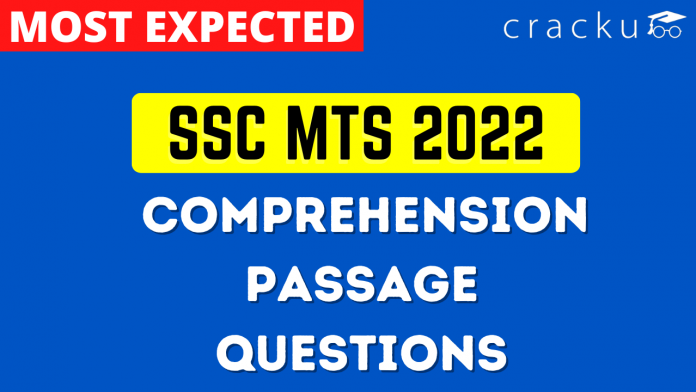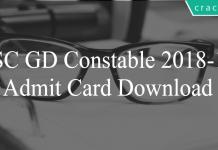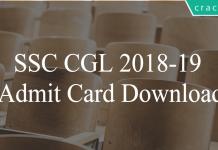Comprehension Passage Questions for SSC MTS
Here you can download the Comprehension Passage Questions for SSC MTS PDF with solutions by Cracku. These are the most important Comprehension Passage questions PDF prepared by various sources also based on previous year’s papers. Utilize this PDF for Comprehension Passage for SSC MTS. You can find a list of Comprehension Passage in this PDF which help you to test yourself and practice. So you can click on the below link to download the PDF for reference and do more practice.
Download Comprehension Passage Questions for SSC MTS
Enroll to 15 SSC MTS 2022 Mocks At Just Rs. 149
Instructions
Read the following passage and answer the questions below.
Consider your average morning routine. Most of us begin taking in the day’s news as soon as the clock radio wakes us up. Then there is the morning news brief from the television while eating breakfast followed by a local radio station during our commute. Throughout the day people continue to glean important events from news sites on the internet. Now consider what your day would look like if all of these resources fell silent.
There are continual reminders that our nation’s power grid is much more fragile than we would like to admit. Such threats do exist not only as foreign or domestic, but extra-worldly as well. Modern power grids are managed by computer networks and the potential exists for hacking into those networks to interrupt the power supply. Another less sinister, but just as hazardous threat comes from outside our own planet. The very sun that we rely upon every day occasionally ejects powerful solar flares known as coronal mass ejections or CMEs. These powerful electromagnetic fields can wreak havoc on sensitive electronic components and have already caused major power outages in recent history and scientists continue to predict that the sun is primed for another such event.
The technology for electromagnetic bombs, developed over the past 30 years, is now available to download from on the internet! Googling it demonstrates the ease with which a would-be enemy could devastate society, creating an enormous blackout with mass panic and havoc. Such powerful electronic pulses pose a significant threat to breakdown all traditional communication including satellites that control every aspect of transportation, commerce and ultimately life.
Other potential problems with national and regional grids are not posed by external threats, but by the continued and rapid growth of our own cities. While such power demands are on the rise, the capacity to provide power to them is not keeping pace. The battle between environmental groups and political decision makers only seems to be maintaining the status quo and not improving the reliability of our energy needs.
If any one of these events transpires and our power grid fails, where would we get our news and information? While we could certainly continue to live day-to-day without a sizable amount of the information we take in, there is some information that we simply would find hard to live without. In the case of a regional or national disaster, reliable and accurate information can be the biggest factor in safety and survival.
How fortunate we are that there are trained amateur radio operators scattered across the country who are poised to fill this important gap if ever needed. With an emergency generator and communication tools, these operators have the equipment and coding skills necessary to process and relay important information at a moment’s notice. Many of these operators utilize an assortment of methods, but among them Morse code gets through when other methods fail. As we have seen in so many movies, confirmed by actual real life experiences, the effectual transmission of dahs and dits between trained operators is a very useful method of communicating both securely and accurately. Why not join this family of ham radio operators and enjoy the fun and lifelong friendships that result?
If you prepare by learning Morse code, you will be on the front lines of the vital communication network and could be responsible for bringing peace, comfort and safety information to friends and family. Some things may be better left to others, but wouldn’t you feel safer knowing that you have done everything you could do in an emergency? Morse code continues to be a valuable survival skill for you, your family and for the nation.
– By Gerald Wheeler Ed.D.
Question 1: Which of the following is a synonym to the word “EFFECTUAL” in the context of the passage?
a) productive
b) useless
c) impotent
d) authoritative
e) conclusive
1) Answer (A)
Solution:
The author is talking positively about the Morse code.
So, ‘useless’ and ‘impotent’ can be eliminated.
‘Authoritative’ and ‘conclusive’ are not the words that can be used to describe ‘transmission’.
Hence, ‘productive’ is the correct answer.
Question 2: Which of the following is synonymous to the word “ASSORTMENT” in the context of the passage?
a) similar
b) akin
c) comparable
d) variety
e) group
2) Answer (D)
Solution:
“Many of these operators utilize an assortment of methods, but among them Morse code gets through when other methods fail.”
This sentence suggests that among various method, Morse code gets through whereas others fail.
=> Assortment must mean ‘various’.
=> Options A, B and C can be eliminated.
“Group of methods” appears to be a restricted list wheras “variety of methods” appears to be many methods.
Hence, ‘variety’ is a better fit for the blank.
=> Option D is the answer.
Question 3: Which of the following is synonymous to the word “SINISTER” in the context of the passage?
a) nasty
b) lucky
c) corrupt
d) fortunate
e) bland
3) Answer (A)
Solution:
“Another less sinister, but just as hazardous threat comes from outside our own planet.”
The word sinister must give the same connotation as hazardous.
=> Options B, D and E can be eliminated.
“Corrupt threat” is not appropriate.
=> ‘nasty’ is the answer.
Question 4: What is the advantage of learning Morse code, according to the passage?
a) You will get very good jobs in the field of disaster management
b) You can bring peace and safety to the society
c) You will be able to make a difference to the society
d) You can find the solutions of the problems described in the passage
e) None of these
4) Answer (B)
Solution:
“… could be responsible for bringing peace, comfort and safety information to friends and family.”
From this statement, we can say that option B is the answer.
Question 5: Why is the technology for electromagnetic bombs a potential hazard for the nation’s power-grid?
a) It takes 30 more years to develop this technology.
b) It will create innumerable issues in transportation, commerce and ultimately life.
c) It breaksdown all traditional communication.
d) It is easily available to a would-be enemy.
e) None of these
5) Answer (D)
Solution:
Option A is wrong.
Options B and C are true if the technology falls into the wrong hands.
The actual reason that this technology is a potential hazard is that it is easily available to a would-be enemy.
Hence, option D is the answer.
Take a free SSC MTS Tier-1 mock test
Download SSC CGL Tier-1 Previous Papers PDF
Question 6: Why did the author ask to consider a world that has none of the radio resources?
a) To make us aware of what a normal individual would do daily.
b) To change from the daily routine for a few days.
c) To make us understand the intensity of the problem he is trying to point out.
d) To help us be ready to face such a situation in the near future.
e) None of these
6) Answer (C)
Solution:
The author describes the general situation about the radio in the current world. Then he says to consider a situation where the radio-stations are not present.
Then he describes about the problems that could create such a situation.
So, the author is trying to make us understand the important of the problem.
Hence, option C is the answer.
Question 7: Why are the CMEs a probable hazard to the nation’s power-grid?
a) They cause major power outages
b) They have more current passing in them than in the power-grid
c) They are less sinister than the threat of hacking into the power-grid network
d) They cause a lot of damage to transportation, commerce and ultimately life
e) They damage delicate electronic components
7) Answer (E)
Solution:
“These powerful electromagnetic fields can wreak havoc on sensitive electronic components and have already caused major power outages in recent history.”
They caused major power outages in the past. This does not imply that they do that always => Option A can be eliminated.
Option E is clearly the answer as we can deduce from the first part of the above sentence.
Question 8: How many potential problems for the nation’s power-grid has the author described in the passage?
a) 1
b) 2
c) 3
d) 4
e) 5
8) Answer (D)
Solution:
The potential problems that the author described are “Possibility of hacking into the power-grid software”, “Coronal Mass ejections” ,”Electromagnetic bombs” and “Rapid growth of the cities”.
Hence, the author described 4 problems in the passage.
Question 9: What is the main point of the passage?
a) To describe how fragile the nation’s power-grid is.
b) To persuade the citizens to fight against the government to address the issues faced by the power-grid.
c) To help us understand how important the daily news is.
d) To persuade the citizens to learn the Morse code to be ready to face probable disasters.
e) To make us aware of the oncoming disaster.
9) Answer (D)
Solution:
The author describes the various issues that can occur with the power and then persuades you to learn Morse code in order to keep yourself, your family and your nation safe.
This statement is best described in option D.
Hence, option D is the answer.
Question 10: What is the author’s tone in the passage?
a) Analytical
b) Descriptive
c) Persuasive
d) Cynical
e) Sarcastic
10) Answer (C)
Solution:
The author describes the various issues that can occur with the power and then persuades you to learn Morse code in order to keep yourself, your family and your nation safe.
Hence, the author’s tone is persuasive.
Instructions
Read the passage given below and answer the following questions
Firms are said to be in perfect competition when the following conditions occur: (1) many firms produce identical products; (2) many buyers are available to buy the product, and many sellers are available to sell the product; (3) sellers and buyers have all relevant information to make rational decisions about the product being bought and sold; and (4) firms can enter and leave the market without any restrictions—in other words, there is free entry and exit into and out of the market.
A perfectly competitive firm is known as a price taker, because the pressure of competing firms forces them to accept the prevailing equilibrium price in the market. If a firm in a perfectly competitive market raises the price of its product by so much as a penny, it will lose all of its sales to competitors. When a wheat grower, wants to know what the going price of wheat is, he or she has to go to the computer or listen to the radio to check. The market price is determined solely by supply and demand in the entire market and not the individual farmer. Also, a perfectly competitive firm must be a very small player in the overall market, so that it can increase or decrease output without noticeably affecting the overall quantity supplied and price in the market.
A perfectly competitive market is a hypothetical extreme; however, producers in a number of industries do face many competitor firms selling highly similar goods, in which case they must often act as price takers. Agricultural markets are often used as an example. The same crops grown by different farmers are largely interchangeable. According to the United States Department of Agriculture monthly reports, in 2015, U.S. corn farmers received an average price of $6.00 per bushel and wheat farmers received an average price of $6.00 per bushel. A corn farmer who attempted to sell at $7.00 per bushel, or a wheat grower who attempted to sell for $8.00 per bushel, would not have found any buyers. A perfectly competitive firm will not sell below the equilibrium price either. Why should they when they can sell all they want at the higher price?
Source: Principles of Economics, Download for free at http://cnx.org/content/col11613/latest.
Question 11: Choose the word that is synonymous with the word “Hypothetical” as used in the passage.
a) Theoretical
b) Incidental
c) Exploitative
d) Superlative
e) Abstract
11) Answer (A)
Solution:
The author says that the idea of perfectly competitive market is a “hypothetical” extreme but similar though not exactly same conditions exist in many industries. Hypothetical, as used in the passage, means theoretical. Hence, option A.
Question 12: Choose the word that is synonymous with the word “Prevailing” as used in the passage.
a) Deterministic
b) Conquering
c) Current
d) Popular
e) Redundant
12) Answer (C)
Solution:
The passage refers to “prevailing equilibrium price” which refers to the price existing in the market at that particular point of time. Hence, current is synonymous with prevailing as used in the passage.
Question 13: What is the purpose of the passage?
a) To encourage perfect competition in all fields
b) To explain how an individual producer is a price taker in a perfectly competitive market
c) To explain why perfect competition is hurting our farmers
d) To explain supply and demand economics to the reader
e) None of the above
13) Answer (B)
Solution:
The passage explains how the price of a good is set in a market with perfect competition and goes on to explain why a producer cannot individually decide the price in cases where perfect competition exists. Hence, option B.
Question 14: From the passage, it can be inferred that the author is a
a) Wheat Farmer
b) Economist
c) Agricultural Scientist
d) Manufacturer
e) Book Critic
14) Answer (B)
Solution:
The passage gives us the economic theory behind the concept of perfect competition. As an economics concept is explained, the author is likely to be an Economist.
Question 15: Which of the following can be inferred from the information given in the passage?
I) A perfectly competitive market does not exist in real life
II) A firm in a perfectly competitive market cannot sell its products below market price due to regulations
III) Agriculture is the only sector in which there is perfect competition
a) I only
b) II only
c) I and II only
d) III only
e) II and III only
15) Answer (A)
Solution:
The passage says that a perfectly competitive market is a “hypothetical extreme” i.e. it is merely theoretical and not practical. Thus, we can infer statement I. Statement II is not stated in the passage and III is not true according to the passage. Hence, option A.
Question 16: Why, according to the author, must a perfectly competitive firm be a small player in the overall market?
a) The firm should not have higher bargaining power due to its significant size
b) The firm should not have higher profit margins than its competitors due to economies of scale
c) The increase or decrease in output of the firm should not alter the supply available in the market and hence indirectly affect the market price
d) A large player may affect the flow of information in the overall market thereby distorting the market price
e) None of the above
16) Answer (C)
Solution:
The passage states that “a perfectly competitive firm must be a very small player in the overall market, so that it can increase or decrease output without noticeably affecting the overall quantity supplied and price in the market”. Hence, option C.
Question 17: Why is agriculture a good example of perfect competition?
a) There is very little distinction between same crops produced by different farmers
b) It is a highly regulated market where prices are determined by the market
c) There is a large amount of fluctuation in demand and supply from one season to another
d) Data about farming is easily available from the US Dept of Agriculture
e) None of the above
17) Answer (A)
Solution:
One of the conditions for perfect competition to exist is that the products produced by different firms should be identical. The passage states that as the produce of different farmers is largely interchangeable, agriculture markets are good examples of perfect competition.
Hence, the correct option is option (a)
Question 18: The rules of perfect competition would definitely not apply to which of the following firms?
I) A wheat farmer
II) A firm that produces standardized nuts and bolts
III) A utilities company that has monopoly over electricity supply to an area
IV) A firm that has an exclusive patent over its products
a) I and II only
b) I, II and III only
c) II, III and IV only
d) I, III and IV only
e) III and IV only
18) Answer (E)
Solution:
One of the conditions mentioned for existence of perfect competition is that many firms should produce an identical product. In the case of III and IV, there are no competitors producing exactly same product as the firm. Hence, the rules of perfect competition would not apply to them.
Question 19: According to the author, who determines the price of wheat?
a) The Government
b) Market Supply and Demand
c) Individual Farmers
d) Wheat Buyers
e) None of the above
19) Answer (B)
Solution:
The passage states that the price of wheat is not decided by individual farmers and is decided solely by the supply and demand in the market. Hence, the correct answer is option B.
Question 20: According to the passage, why is a perfectly competitive firm a price taker?
a) A perfectly competitive firm is a price taker as it cannot afford to sell its products below the market price
b) A perfectly competitive firm is a price taker as prices are determined by the buyers and not sellers of goods
c) A perfectly competitive firm produces products that are identical to the products produced by its competitors
d) A perfectly competitive firm cannot charge above the market price as it will lose all its customers
e) None of the above
20) Answer (D)
Solution:
According to the passage, a perfectly competitive firm cannot sell its goods above the market price as it would lose all of its customers to its competitors. Hence, it is forced to sell it at market price. Thus, the correct answer is option D.





